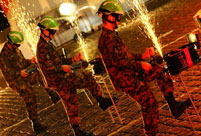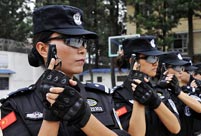It is a common thing nowadays to see a foreign official refereeing in the Chinese Football Association Super League. In the first half of the CSL this year, foreign officials have refereed 32 matches, accounting for 27% of the total. Recently, however, there have been a spate of problems relating to refereeing. A debate has been ignited on whether native or foreign referees are better.
Domestic referees have weaknesses.
In an investigation conducted by CSL, a majority of football clubs, coaches, and players favored native referees over foreign ones. This shows that they have confidence in native referees. However, native referees have many weaknesses.
Zhai Bolin, a member of the Shanghai Football Association Referee Committee and former international football referee, told a reporter: "It took me seven years and about one hundred matches to progress from a national referee to an international referee. But in recent years, some referees have made this transition in just two or three years. Partly because fewer people are taking up the job, the requirements are being reduced in order to keep up the numbers in the pool of referees. The resulting lack of experience directly leads to erroneous judgments and missed calls.
As experienced referees retire, the new generation are not ready to take up the reins. Hiring foreign referees is one way to deal with this problem. Using foreign referees is a common practice in many countries. Even so, the frequency and the number of matches officiated are exceptionally high in the CSL.
At critical moments, the judgment of a foreign referee can assist in creating a perception of impartiality. But foreign referees are not always good. A senior manager in the CSL commented that some are referees of poor quality in their own domestic game. And some of their decisions have aroused considerable controversy.
According to internationally applied principles, a referee officiating over a match in a foreign country should, in general, be internationally qualified. However, as many other countries’ domestic seasons run concurrently with the CSL, their associations will not allow their own referees to work in the CSL. As a result, many of the foreign referees in the CSL are below the top standard.
Why does the CSL continue to employ foreign referees?
"If a native referee makes a decision that sparks a controversy, he will come under considerable pressure from the clubs and the general public," says Zhai Bolin. "If the CSL employs foreign referees, people consider that they will be impartial, and that leaves one less thing for the football association to worry about." Moreover, a native referees is paid ten thousand for a match, while foreign referees are often much cheaper. A referee from Thailand, for example, will earn just $500 per match.
The fundamental solution is to cultivate domestic referees.
Zhai Bolin explains: "Hiring foreign referees should be a strategy to develop domestic referees and help them improve their decision-making and their credibility. China lacks referees who are able to take control of the big occasions."
He also refers to the role played by amateur soccer: "Although we are national referees, we started out officiating in amateur matches, which is more difficult. Amateur players are more likely to lose their tempers and become involved in confrontation with the referee. Someone who has been able to officiate in such matches and gain the necessary experience can make the step up to a higher level."
Being heavily involved in college football, Zhao Bolin observes that there are many matches, and few referees. Developing college student referees is therefore of great importance. "A high education and a proficiency in foreign languages are basic qualities on which future Chinese referees can build a worldwide reputation."
 Int'l Military Music Festival kicks off in Moscow
Int'l Military Music Festival kicks off in Moscow Army aviation brigade in actual-troop drill
Army aviation brigade in actual-troop drill Top 10 Chinese provinces for the well-heeled
Top 10 Chinese provinces for the well-heeled  Baby born to save his sister - the story of a savior sibling
Baby born to save his sister - the story of a savior sibling Lady of mystery: Female SWAT team in prison disclosed
Lady of mystery: Female SWAT team in prison disclosed  Single mother, baby live in KFC restaurant for months
Single mother, baby live in KFC restaurant for months Fan Bingbing poses for Malaysian magazine Citta Bella
Fan Bingbing poses for Malaysian magazine Citta Bella Zhang Xinyi covers COSMOPOLITAN
Zhang Xinyi covers COSMOPOLITAN A collection of bizarre rooftop buildings around China
A collection of bizarre rooftop buildings around China Egyptian forces step up crackdown campaign on smuggling tunnels
Egyptian forces step up crackdown campaign on smuggling tunnels China, U.S. conduct joint anti-piracy drill
China, U.S. conduct joint anti-piracy drill  'Abandoned' life in cement boats in Huai River
'Abandoned' life in cement boats in Huai River 2013 Taiwan Int'l Tourism Expo kicks off in Taipei
2013 Taiwan Int'l Tourism Expo kicks off in Taipei Photo story: Take a gap year
Photo story: Take a gap year Nokia's Global Headquarters: visiting a declining empire
Nokia's Global Headquarters: visiting a declining empireDay|Week|Month